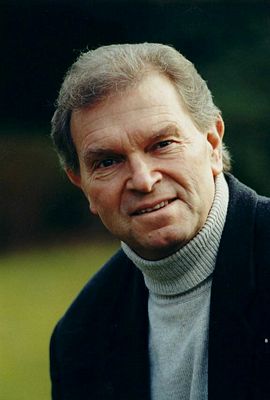|
SINGING DVORÁK

Harald Stamm, one of Germany's foremost operatic basses
and also a renowned Dvorák Stabat Mater soloist,
talks to TESS CREBBIN
Tess Crebbin: You are an opera singer at the Hamburg State Opera since many years, where you sing everything from Wagner to Verdi. How did you first come to the Dvorák Stabat Mater?
Harald Stamm: I am not limited to opera. I have always had an interest in oratorios and concerts, which stems from my love for the Italian composers. So I came to the Verdi Requiem and then one thing followed the other. Since 1971, I have also been singing the Dvorák Stabat Mater. For this work, you need a singer with a more powerful voice than usual and so an operatic bass is well suited to it. In 1971, I sang Dvorák's Stabat Mater for the first time, under Gerd Albrecht, then I sang it under Rafael Kubelik, then at several festivals and so on ... by now I have sung it some fifteen times. There are not many singers capable of singing the bass solo because you need a very powerful voice and an extensive range. Before I became an opera singer I studied sports and for me, singing is also sports, it is a physical exercise. It is my sports background and the physical approach to singing that allows me to preserve my voice as good as it has been preserved despite my age. I sing with immense power but I sing in a relaxed not in a forced manner. My students always told me: write this down and this was how I came to write a book about this method, which was just published. So, if I know that I have to sing something as challenging as Dvorák's Stabat Mater, I have to be physically totally fit. I usually do a lot of swimming because it expands the lung volume. Only on the day of a performance I refrain from it because I would feel the chlorine in my voice that evening.
TC: What exactly do you do on the technical front to prepare for the Dvorák Stabat Mater?

Harald Stamm
|
HS: I first investigate it with the conductor who tells me a bit about how to interpret it. Then I speak about the work with other colleagues to gain their insight also. With Dvorák, you don't even need to know the background of the piece. You just listen to the music and it tells you everything. The Stabat Mater tells you what happened to him while he was composing it, whether you know it or not. It is all there in the music, the grief, the sense of hope, and then the final triumph of faith. It tells you by the harmonies he used, by the unusual scales, by the demanding solo parts. This music means so very much to me, and Dvorák was a magnificent composer of true genius.
Continue >>
Copyright © 1 May 2004
Tess Crebbin, Germany

|

